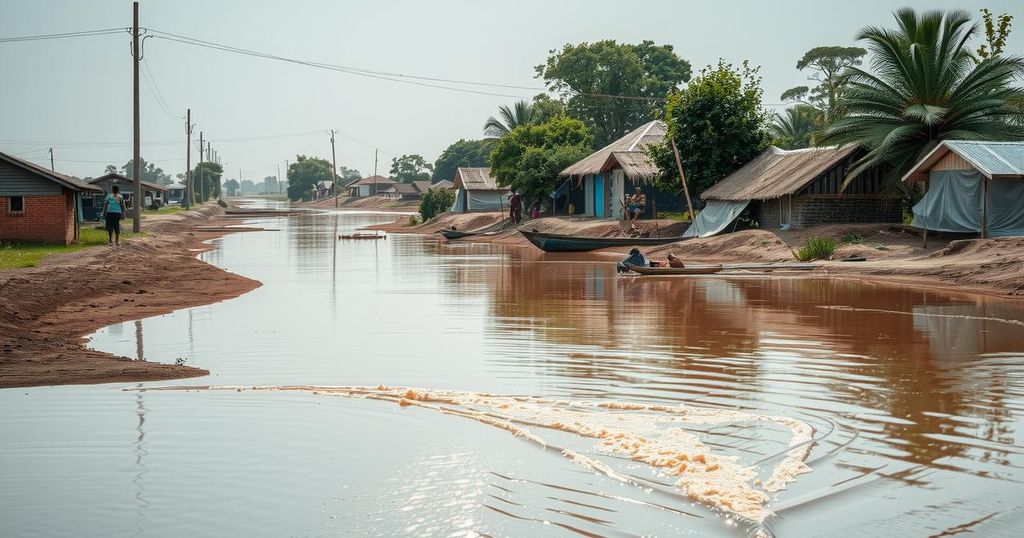Humanitarian Crises in Sudan, Chad, and Lesotho: Flooding and Drought Impact Millions
Sudan and Chad are enduring catastrophic flooding, displacing millions and heightening food insecurity, while Lesotho grapples with a severe drought affecting over 700,000 people. The United Nations is deploying resources to assist those in need across these regions.
Recent reports indicate that both Sudan and Chad are facing severe flooding, while Lesotho is grappling with significant drought conditions. According to Mr. Stephane Dujarric, the chief spokesperson for the United Nations Secretary-General, the UN Office for the Coordination of Humanitarian Affairs (OCHA) has noted that the heavy rains in Sudan have adversely affected approximately half a million individuals in areas such as South Darfur, the Red Sea, the River Nile, and Northern states since late June. In Sudan, the flooding exacerbates an already critical humanitarian crisis. In particular, El Fasher, the capital of North Darfur, has seen around 124,000 people impacted due to the torrential rains. The situation is further complicated by the proliferation of stagnant water, which poses a heightened risk of disease outbreaks, including an alarming 2,900 suspected cholera cases identified since mid-August. The UN and its partners are actively working to provide assistance to those affected by the crisis. Recently, humanitarian groups delivered life-saving therapeutic food to 6,000 children suffering from severe acute malnutrition in Nyala, South Darfur. In Chad, the flooding has resulted in tragic consequences, with reports of at least 340 fatalities and nearly 1.5 million victims. The catastrophic effects of the flooding have led to the destruction of over 160,000 homes, severely impacting agricultural production and contributing to acute hunger among approximately 3.4 million people during the ongoing lean season. In response, Acting UN Emergency Relief Coordinator Ms. Joyce Msuya announced an escalation of the allocation from the Central Emergency Response Fund (CERF) to support Chad’s flood response, increasing funds from $5 million to $8 million. Meanwhile, in Lesotho, the situation has deteriorated due to a historic drought linked to the El Niño phenomenon. An estimated 700,000 individuals are currently battling hunger, prompting the government to declare a national disaster concerning food security in July. Agricultural output has dropped by an average of one-third, raising concerns over future food availability. The acting UN emergency relief coordinator has allocated $2 million from CERF to assist with the drought response, while Ms. Reena Ghelani, the Assistant Secretary-General and Climate Crisis Coordinator, recently visited Lesotho to evaluate the drought’s impact and advocate for increased international support.
The current humanitarian crises in Sudan, Chad, and Lesotho underscore the profound impact of climate change and erratic weather patterns, including prolonged droughts and excessive rainfall. These events often lead to natural disasters that severely disrupt local communities, affect food security, and threaten the well-being of large populations. The United Nations and its partner agencies continuously assess the situation to deploy humanitarian assistance where it is most needed, confirming the urgency of international cooperation in addressing these pressing challenges.
In conclusion, Sudan and Chad are under severe strain due to devastating flooding that has resulted in significant loss of life and widespread displacement, with millions facing increased food insecurity. In contrast, Lesotho is experiencing a critical drought that has pushed hundreds of thousands into hunger. The international community, through agencies such as the UN, is mobilizing resources and assistance to address these crises, highlighting the necessity of cooperative efforts to mitigate the effects of climate change and ensure humanitarian relief for affected populations.
Original Source: news.cgtn.com




Post Comment